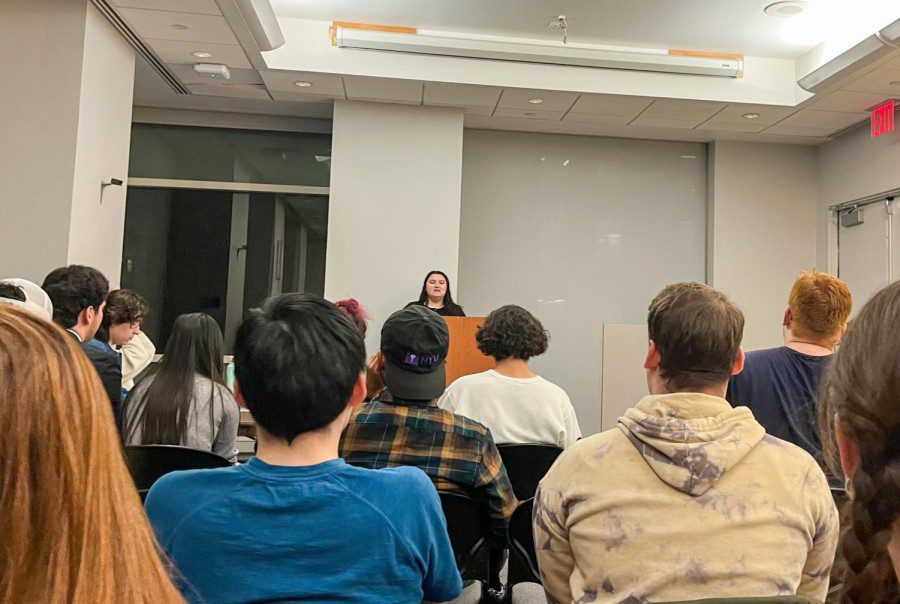What happened at NYU’s annual College Democrats-Republicans debate
In their annual debate hosted by the NYU Politics Society, NYU’s College Democrats and College Republicans faced off over U.S. aid to Ukraine, affirmative action and student loan forgiveness.
A student speaks at a debate between NYU’s College Democrats and Republicans. (Bryn Borzillo for WSN)
December 8, 2022
NYU’s College Democrats and College Republicans tackled affirmative action, student debt relief and U.S. aid to Ukraine during a three-part debate hosted by the NYU Politics Society on Tuesday, Dec. 6. Around 55 students attended the event, a much higher turnout than the previous edition of the event, and participants were repeatedly warned by moderators to stay civil.
U.S. involvement in the war in Ukraine
Graduate student Adnan Ahsan, who represented the Democrats for the first topic, said that foreign aid to Ukraine is necessary to stop Russian hostility and reduce inflation in the United States. Republican Eli Lerner took to the podium in response.
“This debate isn’t about whether we should be supporting Ukraine, because obviously we should be supporting Ukraine,” Lerner said. “The problem is that we need oversight on the way that money is being spent because we need to make sure that money is reaching Ukrainian people.”
Ahsan displayed tweets from former President Donald Trump to argue that the former president was “infatuated” with “warmongering dictator” Vladimir Putin. The two speakers began to yell at one another as the debate erupted into chaos.
“Republicans are more focused on revenge porn than actually dealing with the issues of inflation or the current war in Ukraine,” Ahsan said.
Moderators from the Politics Society called for decorum halfway through the Ukraine debate, and College Republicans switched out their debater to Daniel Chen. Tessa Kilcline, the president of the Society, said that the debates became very intense as the groups touched on divisive topics.
“I thought the debates were very lively,” Kilcline told WSN after the event. “At times, it was a little bit tense, but as the debate progressed, we were able to make things a little more civil.”
Affirmative action in college admissions
Affirmative action in college admissions has come into focus after the recent hearings of two high-profile Supreme Court cases, Victor Andres Marroquin-Merino took to the podium for the College Democrats, while Julian Li represented the Republicans. Li argued that affirmative action has led to universities discriminating against certain groups — particularly Asian students. He proposed replacing the practice with the institution of increased funding for underrepresented high schools.
Marroquin-Merino countered that while the policy has some flaws, it should be reformed rather than abolished. He said that affirmative action is important to counter implicit biases and structural policies that can influence admissions decisions and put applicants at a disadvantage.
“The fundamental reality of our nation is that we live in an unequal society,” Marroquin-Merino said. “Affirmative action remains a crucial step in redressing this inequality by accounting for lived experiences that certain identity groups within the U.S. have faced by simply being themselves.”
Student debt forgiveness
The debaters then turned to discuss student debt forgiveness policies. Democrat Yan Alabaladejo said that President Joe Biden’s student loan debt policy is a temporary solution to the larger debt crisis. The application for Biden’s loan forgiveness program, which promised to relieve debt of up to $20,000 for a select group of loan recipients, opened in October, but has since faced several legal hurdles.
“For a vast majority of Americans, not everything has to go wrong for you to be in trouble with student loans,” Albaladejo said. “Your life could be going well, you could get a job in your field, you could still be struggling with student loans.”
Nathan Sirotovitch, the Republican opponent, argued that Biden’s student loan forgiveness plan could negatively impact inflation. Sirotovitch, who is also president of the College Republicans at NYU, said that even though student loans are a personal issue for many involved in the Politics Society debate, he believes that an individual’s college expenses should not be funded by others.
“Student loan debts don’t actually prevent you from spending money on essentials,” Sirotovitch said. “Even people with student loans in the hundreds and thousands still spend money on grocery bills.”
Contact Bryn Borzillo at [email protected].

























































































































































hungryteacher • Dec 10, 2022 at 7:49 pm
Student loan debts, and all debts, absolutely *do* prevent you from spending money on essentials.
With interest, I’m $200k in the hole for two years of grad school– positioned myself to become a professor at NYU only to discover Adjuncts aren’t paid enough to afford food:
I literally only have food, while employed by one of the wealthiest universities in the world, because people have been donating groceries / gift cards to me for the past 4 years of trying to climb a seemingly non-existent corporate ladder within this school.
Food, shampoo, a toothbrush, toilet paper, rent, electrical bill, internet service, Metro Cards, laundromats, socializing… you cut as much as you can to stay alive. Not to mention health care, ultimately shaving years off your life.
Yes, poverty is a spectrum, but just because those inside the wealth bubble only see the poor while walking past and hiding their faces from them on sidewalk does not mean that they don’t exist. The economic suffering of those around you may be hidden because we’re too busy working and silently crumbling.